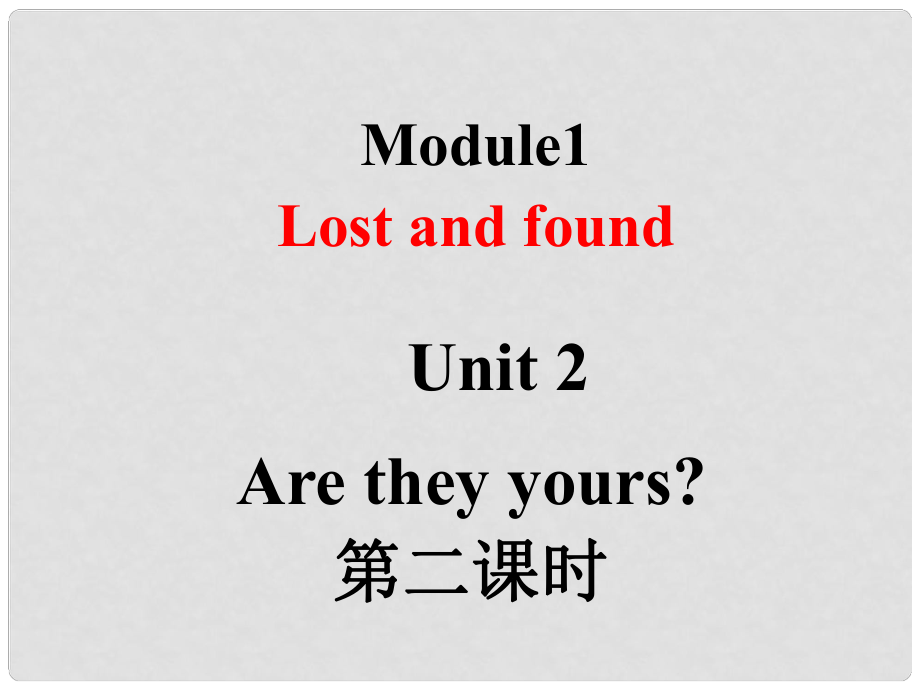《山東省臨朐縣沂山風(fēng)景區(qū)七年級(jí)英語(yǔ)下冊(cè) Module 1 Unit 2 Are they yours(第2課時(shí))課件 (新版)外研版》由會(huì)員分享�,可在線閱讀,更多相關(guān)《山東省臨朐縣沂山風(fēng)景區(qū)七年級(jí)英語(yǔ)下冊(cè) Module 1 Unit 2 Are they yours(第2課時(shí))課件 (新版)外研版(24頁(yè)珍藏版)》請(qǐng)?jiān)谘b配圖網(wǎng)上搜索�。
1、Module1 Lost and found Are they yours?第二課時(shí)第二課時(shí)Unit 2 1�、通過(guò)小組合作、精講點(diǎn)撥�,學(xué)生能夠讀懂U2課文,掌握文中的知識(shí)點(diǎn)�,并且能夠回答相關(guān)問(wèn)題。 2�、通過(guò)自主學(xué)習(xí)、探究合作�,學(xué)生能夠?qū)懗鲫P(guān)于 Lost and Found 的短文。Read the passage .The Lost and Found Office in New York City Welcome to the New York City Lost and Found Office. People often lose things when theyre travellin
2�、g or when theyre in a hurry. They leave things on planes, on trains, on buses and in taxis. Thats why there are lost and found offices at airports and stations.The New York City Lost and Found Office is very big. Hundreds of people come here every day. They are looking for their phones, cameras, wat
3�、ches, computers and many other things. We usually have about two thousand mobile phones and one thousand cameras. At the moment, there are also some strange things at the New York City Lost and Found Office. There are about a hundred bikes and a large boat. There are also a lot of animals. This week
4�、, there are three dogs, two ducks and a pig! Whose are they? Are they yours? We dont know! Are you looking for fifteen kilos of sausages? Theyre here too!1. When do people often lose things? _2. Why are these lost and found offices at airports and stations? _ _ When they are travelling or when theyr
5、e in a hurry.Because people often leave things on planes, on trains, on buses and in taxis.3. What do people do at the lost and found office?_4. What strange things are there at the New York City Lost and Found Office? _ _They look for things they have lost.A large boat, three dogs, two ducks, a pig
6�、 and fifteen kilos of sausages.People often lose things when theyre travelling or when theyre in a hurry. 人們?cè)谌藗冊(cè)诼眯兄谢蚴谴掖颐γr(shí)經(jīng)常丟東西�。旅行中或是匆匆忙忙時(shí)經(jīng)常丟東西。in a hurry 的意思是的意思是“匆匆忙忙匆匆忙忙”�。例句:例句:She went to shool in a hurry. 她匆匆忙忙地去學(xué)校了。Dont be in a hurry. 不要著急�。其他與hurry有關(guān)的短語(yǔ)還有(theres)no hurry,意思是“不忙�,不必著急,有充裕的時(shí)間”�;hu
7、rry up 的意思是“快點(diǎn)兒�,趕緊”。例句:There is no hurry, so do it slowly and carefully.不必趕時(shí)間�,所以要慢慢地、細(xì)心地做�。Hurry up, or we cannot get to the railway station on time.快點(diǎn)兒,否則我們就不能按時(shí)趕到火車站了�。Hurry up, the taxis coming.快點(diǎn)兒,出租車等著呢�。They leave things on planes, on trains, on buses and taxis. 他們把東西落在飛他們把東西落在飛機(jī)、火車�、公交車和出租車上�。機(jī)�、火車
8、�、公交車和出租車上。leave 這里表示這里表示“落下�,遺忘落下,遺忘”�,它還它還有很多其他的含義:有很多其他的含義:1. 表示表示“離開(kāi)離開(kāi)”。例句:例句:Nancy wants to be a doctor when she leaves school. 南希畢業(yè)后想當(dāng)一名醫(yī)生�。南希畢業(yè)后想當(dāng)一名醫(yī)生。 2.表示表示“把(某人或某物)留在(某處)把(某人或某物)留在(某處)”�。例句:例句:I often leave the kids at home with Susan. 我經(jīng)常把孩子們留在家里給蘇珊(照顧)。我經(jīng)常把孩子們留在家里給蘇珊(照顧)�。You can leave the coo
9、king to me.你可以把做飯的事交給我�。你可以把做飯的事交給我。3.表示表示“留到�,留待留到,留待”�。例句:例句:Leave it another week, then tell him hell have to decide. 把此事再放一周,到時(shí)告訴他必須做出決定�。把此事再放一周,到時(shí)告訴他必須做出決定�。4.leave 還可以用作名詞,表示還可以用作名詞�,表示“假期�,休假期�,休假假”。例句:例句:I have to ask for three days leave.我得請(qǐng)三天假�。我得請(qǐng)三天假?!局R(shí)拓展知識(shí)拓展】 leave的三種構(gòu)成:的三種構(gòu)成:(1)leave(遺忘遺忘)+sth
10、. +介詞介詞 把某物遺忘在某地把某物遺忘在某地(2)leave(動(dòng)身動(dòng)身)for somewhere 動(dòng)身去某地動(dòng)身去某地(3)leave(留下留下) sb. by oneself/leave sb. alone 把某把某人獨(dú)自留下人獨(dú)自留下Thats why there are lost and found offices at airports and stations.這就是機(jī)場(chǎng)和火車站都有這就是機(jī)場(chǎng)和火車站都有失物招領(lǐng)辦公室的原因�。失物招領(lǐng)辦公室的原因�。Thats why表示表示“是是的原因的原因”,常用于�,常用于句首,后面跟的是結(jié)果�。句首,后面跟的是結(jié)果�。例句:例句:I got u
11、p in a hurry this morning. Thats why I leave books at home.今天早上我匆匆忙忙起床�。這是我把書(shū)遺忘在今天早上我匆匆忙忙起床。這是我把書(shū)遺忘在家里的原因�。家里的原因。Hundreds of people come here every day.每天每天有幾百人來(lái)這里�。有幾百人來(lái)這里。hundred hundred 是一個(gè)確數(shù)�,表示是一個(gè)確數(shù),表示“一百一百”�;hundreds of hundreds of 是一個(gè)概數(shù)�,表示是一個(gè)概數(shù)�,表示“好幾百,好幾百�,許許多多許許多多”�。1.1.當(dāng)當(dāng)hundred hundred 前面有一個(gè)具體的數(shù)詞
12、時(shí)�,前面有一個(gè)具體的數(shù)詞時(shí),hundredhundred不變?yōu)閺?fù)數(shù)�。不變?yōu)閺?fù)數(shù)。例如:例如:two hundred cows two hundred cows 兩百頭奶牛兩百頭奶牛2.2.當(dāng)當(dāng)hundredhundred與與ofof連用時(shí)�,它后面的名詞和它連用時(shí),它后面的名詞和它本身都用復(fù)數(shù)�。本身都用復(fù)數(shù)。例如:例如:hundred of cows hundred of cows 幾百頭奶牛幾百頭奶牛一�、翻譯下列句子一、翻譯下列句子1.對(duì)不起�,我不能停。我很忙�。 _2.如果想準(zhǔn)時(shí)到那里的話,我們就必須快點(diǎn)�。 _Sorry, I cannot stop. I am in a hurry.We m
13、ust hurry up if we want to be there on time.二�、根據(jù)句意填空二�、根據(jù)句意填空1. I _ my wallet.我的錢包不見(jiàn)了�。2. Dont _ your baby at home.不要把你的小孩留在家里。3. There are _in our school.我們學(xué)校有695名學(xué)生�。4._ new books in the library are for our children.圖書(shū)館內(nèi)成百上千的新書(shū)是給我們的孩子的。loseleavesix hundred and ninety-five studentsHundreds of People i
14�、n a hurry often (1) _ things, and there are (2) _ things at lost and found offices at (3) _ and (4) _. At the New York City Lost and Found Office, there are also some very (5) _things. There are fifteen kilos of (6) _are they yours? And how do you lose a (7) _ boat on a train?Complete the passage wi
15、th the correct form of the words and expression from the box.airport hundreds of large lose sausage station strangelose hundreds ofairportsstationstrangesausage large Writing read the lost and found notes.Write notes for two more things.Lost My gloves.Theyre blue and white. Call Tony at 8574 9326.Fo
16�、und Is this your bag?Call Betty at 2369 0390.A Possible VersionLost A blue wallet.At school.Call Lingling at XXX.FoundIs this your red bag?Found at the station.Call Li at XXX.Complete the notices with the words or phone number in the box.yours found 284-5486 lost call_:My notebook.My name is David.Please_ me at 679-8871._:A set of keys.Are these_?Call Jenny at_.LostcallFoundyours284-5486
 山東省臨朐縣沂山風(fēng)景區(qū)七年級(jí)英語(yǔ)下冊(cè) Module 1 Unit 2 Are they yours(第2課時(shí))課件 (新版)外研版
山東省臨朐縣沂山風(fēng)景區(qū)七年級(jí)英語(yǔ)下冊(cè) Module 1 Unit 2 Are they yours(第2課時(shí))課件 (新版)外研版

